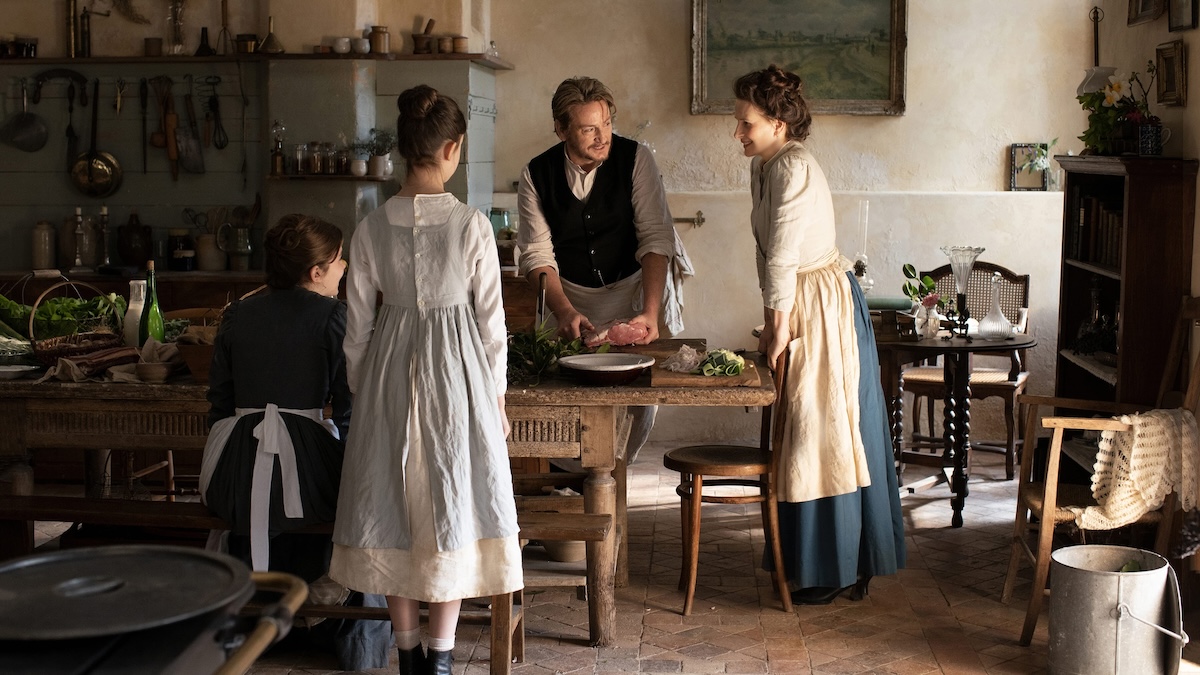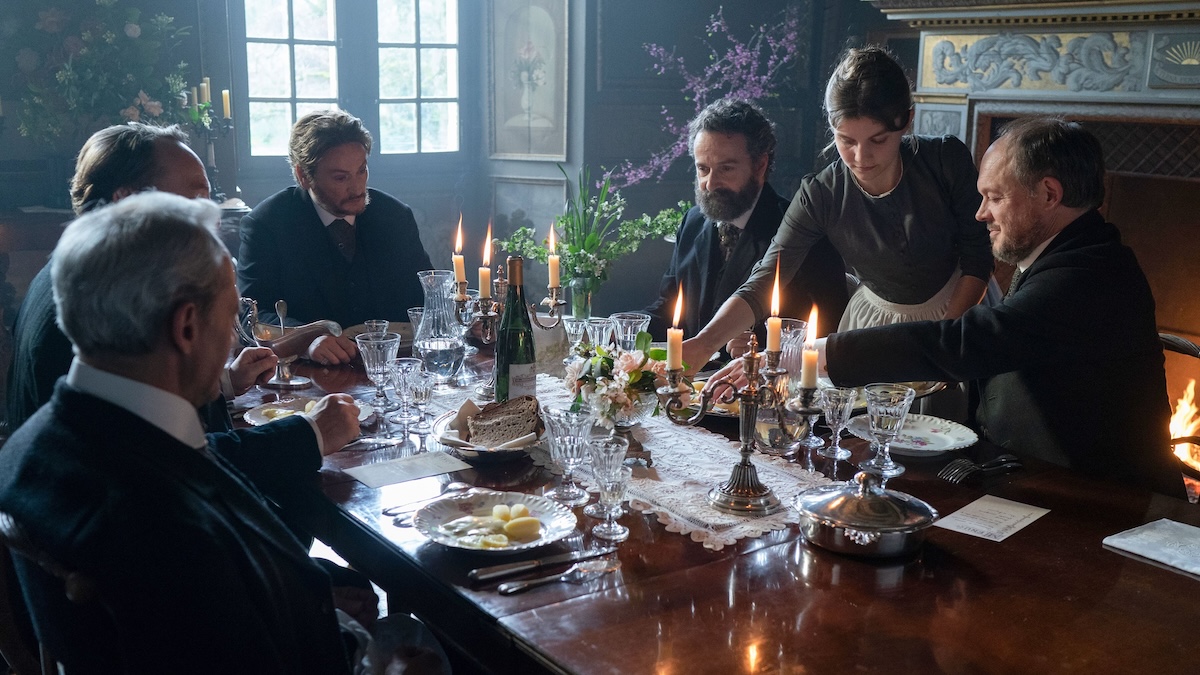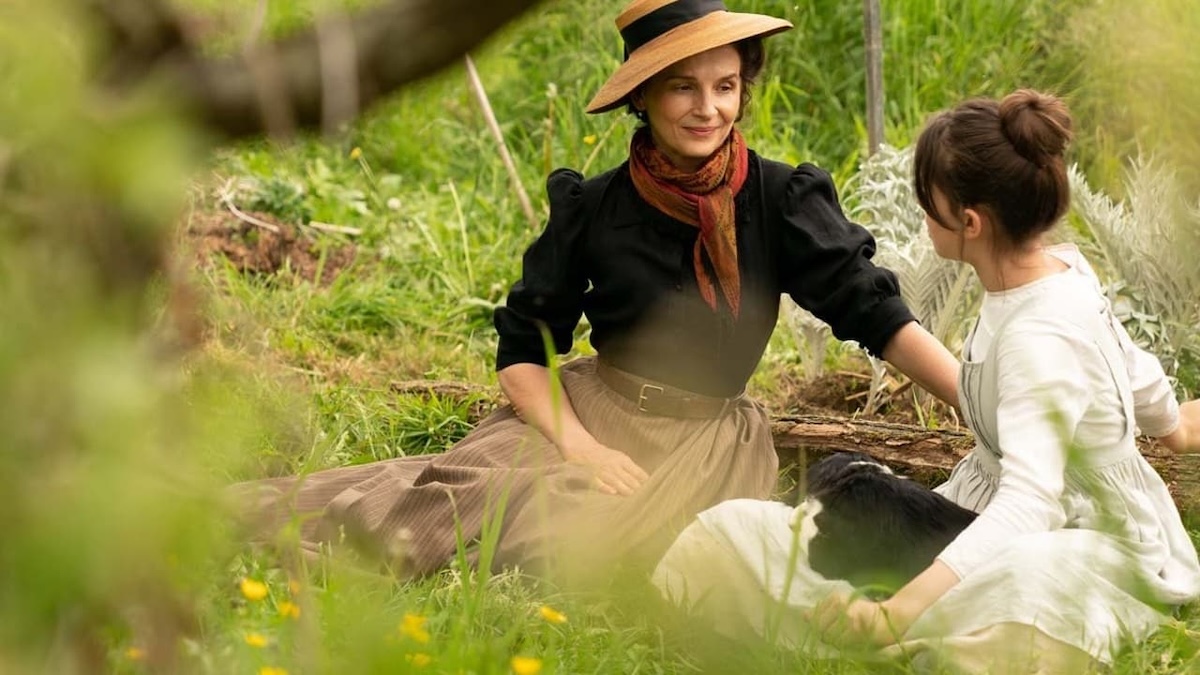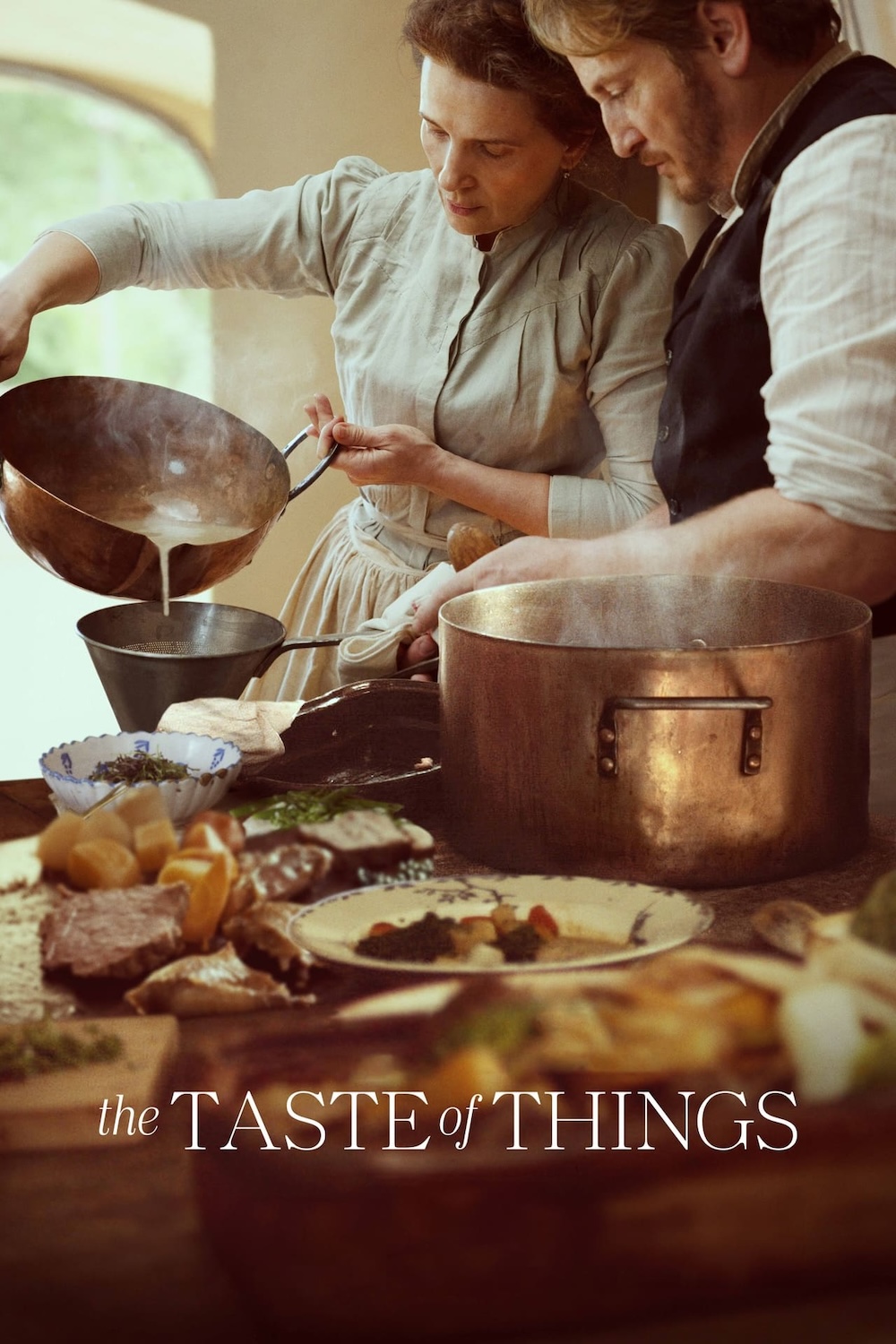THE TASTE OF THINGS (2023)
The story of Eugenie, an esteemed cook, and Dodin, the fine gourmet who she has been working for over the last 20 years.

The story of Eugenie, an esteemed cook, and Dodin, the fine gourmet who she has been working for over the last 20 years.


A richly detailed, sumptuous heartbreaker for lovers of Babette’s Feast (1987) and Chocolat (2000) celebrates life’s greatest pleasures and mourns their passing. I’ve never cried over a meal, but The Taste of Things / La Passion de Dodin Bouffant, a new French historical romance, makes me wonder if something might be wrong with me.
This lovely culinary drama opens with scenes of household gardeners in a rural setting, harvesting vegetables from a small but bountiful garden. Their labours are bathed in the warm hues of an autumn afternoon, creating a scene that evokes a world where it’s always summer.
We follow the harvesters into a grand French household kitchen, where Dodin Bouffant (Benoît Magimel), a stuffy-looking French bourgeois, patiently instructs young Pauline (Bonnie Chagneau-Ravoire) not on how to cook but on how to taste the food that she will one day prepare herself. Dodin’s palate is so refined, he suggests eating an omelette with a spoon.

Meanwhile, in the background, Dodin’s household cook, Eugenie (Juliette Binoche), flits about with swan-like grace. Course by course, she assembles an elaborate and intricate meal with poise and authority. She’s fully in her element, a confident master of her domain, each utensil an extension of her graceful hands.
The film might appeal solely to the senses of sight and sound, but here, it induces synaesthesia: you can almost taste and smell the images, the aromas swirling like clouds through the kitchen setting. You’ll be longing to leap through the screen and take a seat at the table.
After a while—a long while—we’re guided upstairs to Dodin’s elegant dining room for the monthly gathering of his dinner club, a haute bourgeoise group of male gourmands. In the back of my mind, thoughts stirred that we might be in for an Upstairs Downstairs / Downton Abbey stew of gender and class warfare, pots and pans flying, set in the 19th-century French countryside, an attempt to reflect our own conflicts.

This film focuses on people within their own time and place, and how they see and live in their world. These men are more than cardboard Marxist cultural stereotypes. They’re avatars of geekery, obsessing over the obscure details of culinary history as much as superfans obsess over Star Wars (1977). They weep tears of joy at Eugenie’s every dish, then line up in the kitchen afterwards to pay generous tribute.
They’re the sort who eat steaming bowls of soup with towels over their heads to capture every molecule of aroma and flavour. It’s hilarious, but this film helps us to understand at least. Like good eclectics, they eat from every corner of the banquet table, all sections of the menu. From aperitifs through to the main course and dessert, there’s no bad food. To love good food is to love life.
The Taste of Things pays tribute to a kind of soulful materialism, where food is imbued with spirit. It’s also a bit of slow cinema about an eccentric and beautiful partnership in its sunset years. Now middle-aged, Dodin and Eugenie have lived together for decades, their roles set: Dodin as master of the house and Eugenie as the cook. They’re occasional lovers but sleep in separate bedrooms, to Dodin’s poignant frustration. He’s occasionally proposed marriage, but Eugenie has always declined. Marriage would make her a full partner, but she’s conservative, preferring things as they are. To glib observers, Dodin holds the power but anyone who takes a seat at their table will see a relationship of give and take, two decent people perfectly poised, as though on a seesaw.

But then comes a dark pang of sadness, predictable but painful nonetheless. Eugenie has recently been suffering from spells of fainting and chest pains. Dodin urges her to see a doctor (who’s also a member of his dining club), but Eugenie refuses, insisting everything is alright. How could their life together ever end?
As Eugenie’s attacks become more frequent, leaving her bedridden, Dodin takes on the role of her servant. He might be as good a cook as she, but he lacks her ease and confidence. He rushes about the kitchen, panting with anxiety and desperation. Soon, their long journey together will end, leaving him alone at the table.
To call The Taste of Things flavourful doesn’t even begin to describe it. In contrast to Hulu’s TV series The Bear, this exquisitely slow cinematic experience requires some patience, but it’s well worth it. This is no kitchen warfare, but a good long dinner with friends from another era and with a different set of values.

Vietnamese-French writer-director Trần Anh Hùng (The Scent of Green Papaya) adapted a 1924 novel by Marcel Rouff, creating an exquisite blend of joy and heartbreak. With cinematographer Jonathan Ricquebourg behind the camera, every frame is a sensual delight. The food is all real, prepared on set. Our stomachs growl, and our hearts break.
In place of music, the soundtrack uses the sounds of cooking and boiling—the cacophony of pots, pans, and dishes—as apt substitutes, along with Dodin’s sighs of frustration. Rather than using reverse cuts in dialogue scenes, Hùng allows the camera to pan leisurely back and forth between the characters, as if inviting us to join the conversation.
The film lays a generous table with one of the most touching portrayals of a partnership between a man and a woman that I’ve ever seen. As Eugenie, Juliette Binoche’s classic, fine-boned elegance blends perfectly with her veteran actor’s mastery of character and material. But the real discovery, at least for American audiences, is Benoît Magimel, who plays Dodin with passion, insight, and a rugged elegance reminiscent of the great Claude Rains. He portrays a man brimming with love and roiled by grief, eliciting a rare flood of tears from even this stoic critic.
FRANCE • BELGIUM | 2023 | 134 MINUTES | COLOUR | FRENCH


writer & director: Trần Anh Hùng.
starring: Juliette Binoche, Benoît Magimel, Emmanuel Salinger, Patrick d’Assumçao, Galatea Bellugi, Jan Hammenecker, Frédéric Fisbach, Bonnie Chagneau-Ravoire, Jean-Marc Roulot, Yannik Landrein & Sarah Adler.
